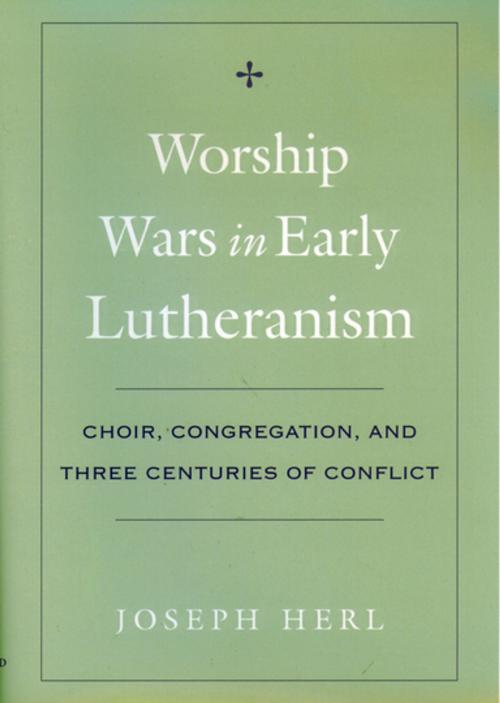Worship Wars in Early Lutheranism
Choir, Congregation, and Three Centuries of Conflict
Nonfiction, Entertainment, Music, Music Styles, Religious, Theory & Criticism, History & Criticism, Reference| Author: | Joseph Herl | ISBN: | 9780199882465 |
| Publisher: | Oxford University Press | Publication: | July 1, 2004 |
| Imprint: | Oxford University Press | Language: | English |
| Author: | Joseph Herl |
| ISBN: | 9780199882465 |
| Publisher: | Oxford University Press |
| Publication: | July 1, 2004 |
| Imprint: | Oxford University Press |
| Language: | English |
How important was music to Martin Luther? Drawing on hundreds of liturgical documents, contemporary accounts of services, books on church music, and other sources, Joseph Herl rewrites the history of music and congregational song in German Lutheran churches. Herl traces the path of music and congregational song in the Lutheran church from the Reformation to 1800, to show how it acquired its reputation as the "singing church." In the centuries after its founding, in a debate that was to have a strong impact on Johann Sebastian Bach and his contemporaries, the Lutheran church was torn over a new style of church music that many found more entertaining than devotional. By the end of the eighteenth century, Lutherans were trying to hold their own against a new secularism, and many members of the clergy favored wholesale revision or even abandonment of the historic liturgy in order to make worship more relevant in contemporary society. Herl paints a vivid picture of these developments, using as a backdrop the gradual transition from a choral to a congregational liturgy. The author eschews the usual analyses of musical repertoire and deals instead with events, people and ideas, drawing readers inside the story and helping them sense what it must have been like to attend a Lutheran church in the sixteenth through eighteenth centuries. Parallel developments in Catholic churches are discussed, as are the rise of organ accompaniment of hymns and questions of musical performance practice. Although written with academic precision, the writing is clear and comprehensible to the nonspecialist, and entertaining anecdotes abound. Appendixes include translations of several important historical documents and a set of tables outlining the Lutheran mass as presented in 172 different liturgical orders. The bibliography includes 400 Lutheran church orders and reports of ecclesiastical visitations read by the author.
How important was music to Martin Luther? Drawing on hundreds of liturgical documents, contemporary accounts of services, books on church music, and other sources, Joseph Herl rewrites the history of music and congregational song in German Lutheran churches. Herl traces the path of music and congregational song in the Lutheran church from the Reformation to 1800, to show how it acquired its reputation as the "singing church." In the centuries after its founding, in a debate that was to have a strong impact on Johann Sebastian Bach and his contemporaries, the Lutheran church was torn over a new style of church music that many found more entertaining than devotional. By the end of the eighteenth century, Lutherans were trying to hold their own against a new secularism, and many members of the clergy favored wholesale revision or even abandonment of the historic liturgy in order to make worship more relevant in contemporary society. Herl paints a vivid picture of these developments, using as a backdrop the gradual transition from a choral to a congregational liturgy. The author eschews the usual analyses of musical repertoire and deals instead with events, people and ideas, drawing readers inside the story and helping them sense what it must have been like to attend a Lutheran church in the sixteenth through eighteenth centuries. Parallel developments in Catholic churches are discussed, as are the rise of organ accompaniment of hymns and questions of musical performance practice. Although written with academic precision, the writing is clear and comprehensible to the nonspecialist, and entertaining anecdotes abound. Appendixes include translations of several important historical documents and a set of tables outlining the Lutheran mass as presented in 172 different liturgical orders. The bibliography includes 400 Lutheran church orders and reports of ecclesiastical visitations read by the author.















